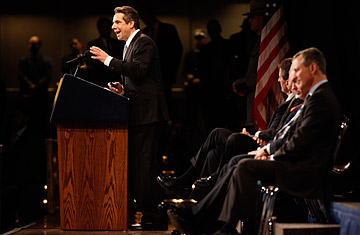
New York Governor Andrew Cuomo delivers his State of the State address at the Empire State Plaza Convention center in the New York State Capitol complex in Albany.
Much of the country is recovering from the Great Recession, yet in state capitols, the crisis persists. State tax revenue is rebounding, but not fast enough to keep up with soaring costs. That's why states are taking dramatic steps: In Illinois, the governor has signed an unusual measure raising personal and corporate income taxes to resolve a $13 billion-plus budget deficit. New York's governor is vowing to trim the total number of state agencies by 20%. Meanwhile, in Virginia, the governor is pressing his legislature to privatize state-owned liquor stores. But will any of this stem states' budget crises?
It isn't a one-year problem. State budget gaps are expected to total about $26.7 billion this fiscal year, but then rise to about $82 billion in fiscal year 2012, which in most states begins July 1. President Barack Obama's American Recovery Act provided some cushion — allowing, for instance, states to continue with highway projects. But that money is starting to run out. The National Association of State Budget Officers projects that tax revenues nationwide will grow about 5% this year. New York may offer a sign of what's to come. In the third quarter of last year, the state reported total tax revenues rose about 3%, to $411 million, from the year-earlier period. But that's not enough to deal with the crisis. "No one knew how hard the recession would hit the country — most people didn't expect it to be this bad," says Robert Ward, deputy director of the Rockefeller Institute of Government at the State University of New York.
In his first state of the state address, New York governor Andrew Cuomo earlier this month made clear that with a $10 billion budget gap, he must impose stringent measures, like a one-year salary freeze, shrinking the number of state agencies and commissions by 20%; the departments of insurance, consumer affairs and banking, for instance, would be housed within a department of financial regulation. Cuomo has also proposed limiting to 2% the amount communities can raise property taxes in a given year. "This is a fundamental realignment for the state," Cuomo said in the state of the state address, adding, "New York has no future as the tax capital of the nation..business will not come." Meanwhile, in Washington state, Gov. Chris Gregoire is moving to reduce pension costs by giving older citizens who'll probably never get back into the workforce a lump sum of money, all part of an effort to save $560 million over four years.
California's new governor, Jerry Brown, has already proposed some $12 billion in cuts to welfare and criminal justice systems, among other programs. In one of his first moves as governor, the Democrat ordered employees to return 48,000 government cell phones, potentially saving the state $20 million. Brown faces $25 billion budget shortfall.
But some of the speediest cost-cutting steps have been in Illinois. Pat Quinn, a Democrat, assumed the governor's office in January 2009, following the ouster of Rod Blagojevich. By nearly every measure, Quinn inherited a state in crisis. "For years, the state has been behind in paying its ills. It got worse, and worse," he said last week. So Quinn took the risk of backing measures to reduce Illinois' general fund by 10.5%, or $3 billion, in addition to moving some 1,100 employees off his government's payroll, potentially saving $25 million. Education grants were cut by more than $60 million, and support for the arts, by $2.5 million. "We had to take decisive action," he said. But the boldest move: Illinois residents' personal income taxes will rise from 3% to 5% through 2014. The state's corporate income tax, meanwhile, will rise from 4.8% to 7%.
Illinois' neighbors are welcoming the news. Indiana Gov. Mitch Daniels, a Republican, last week boasted to a Chicago radio station: "If you want to bring new jobs to your state, the last thing you do is make it more expensive to hire people." He added: "We're now at the top of everybody's list as a good place to do business."
